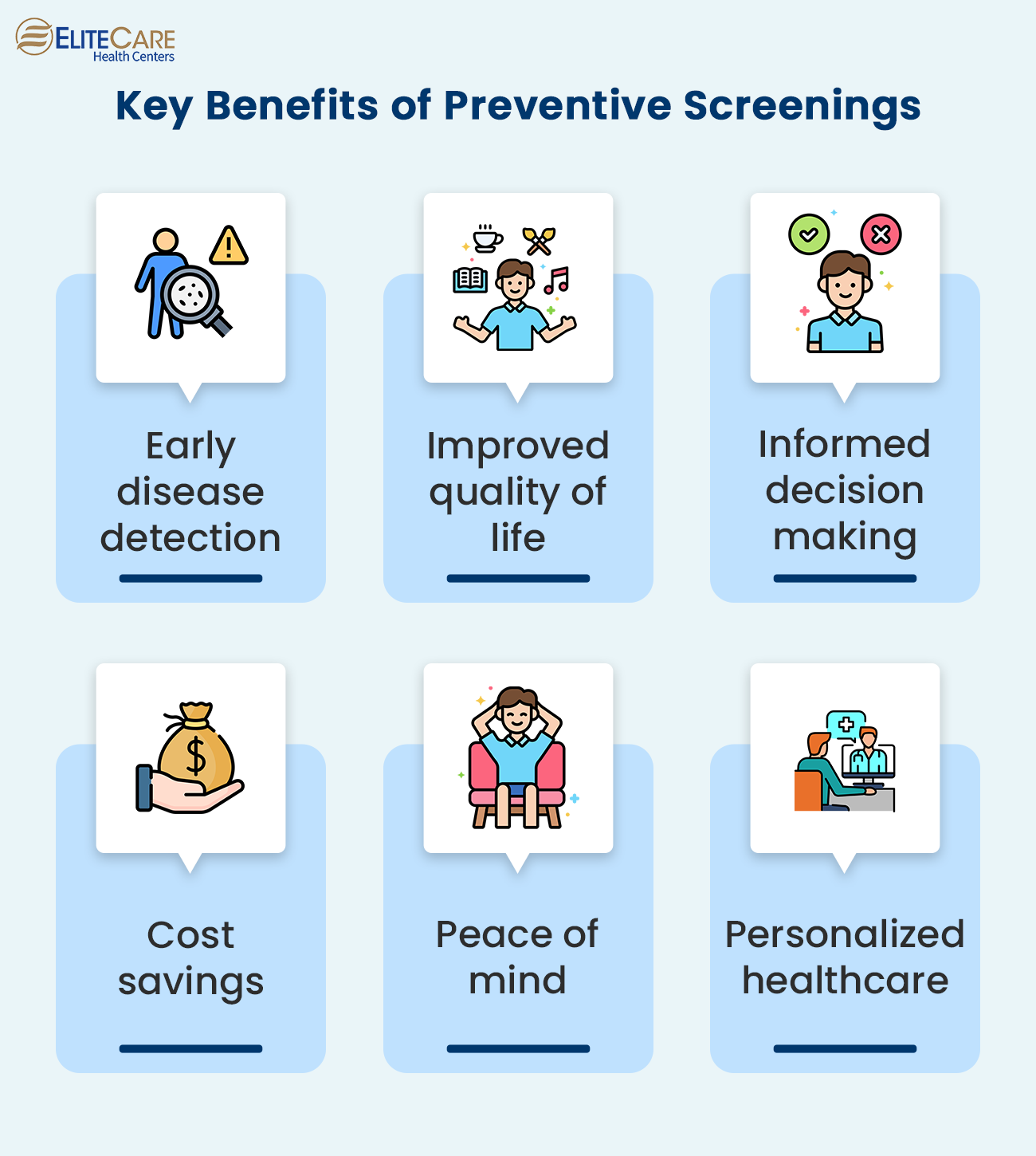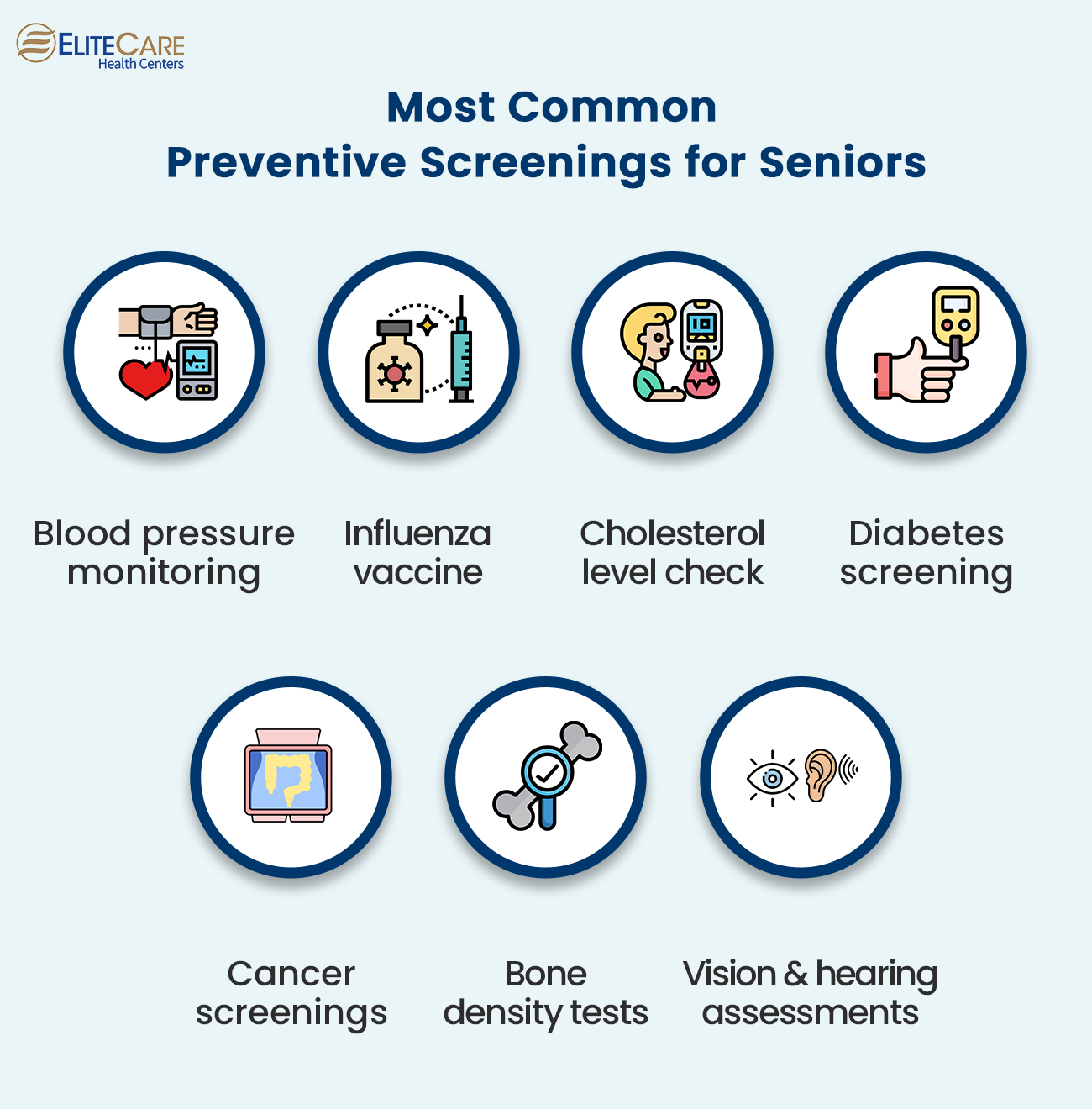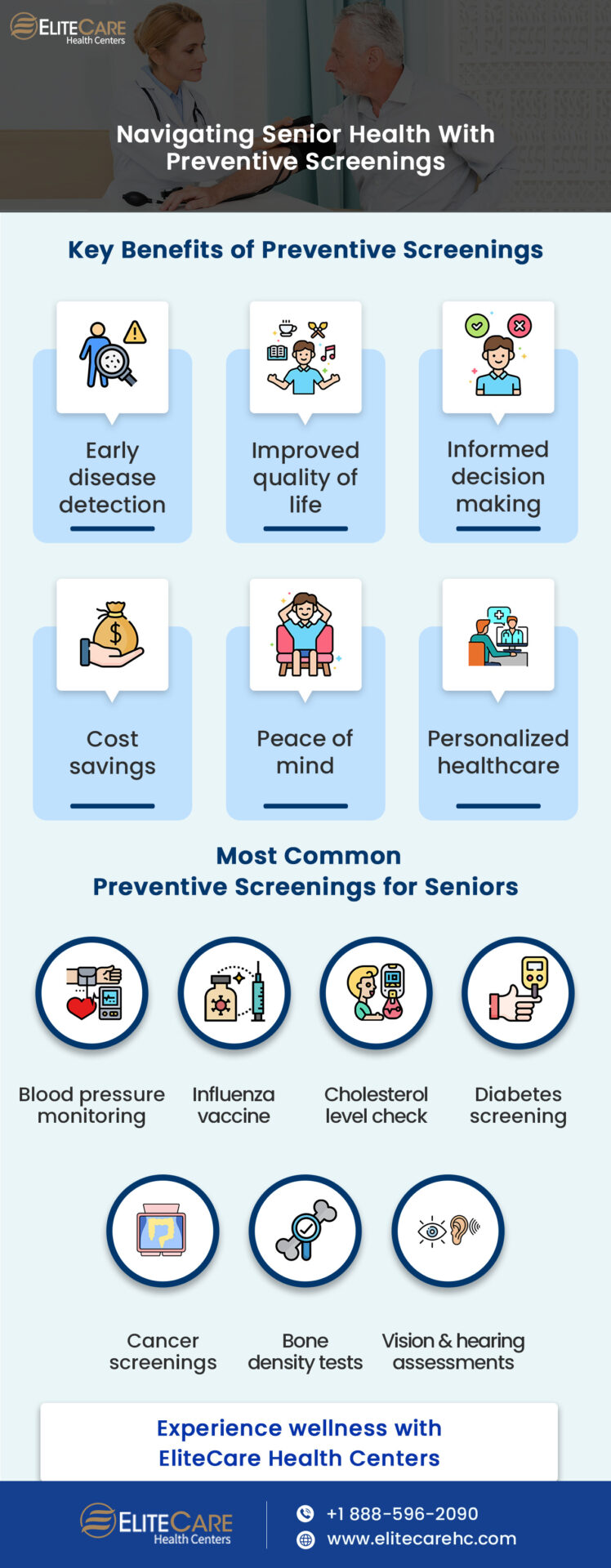
In the journey of aging gracefully, one crucial aspect often overlooked is preventative health. With age, the risk of health issues increases, and taking proactive measures to ensure well-being becomes increasingly vital. In this blog post, let us understand preventive care and how it can benefit seniors.
What is Preventive Screening
Preventive screenings are an essential component of maintaining optimal health. These screenings involve a series of medical tests and assessments conducted at a medical clinic to identify potential health concerns before symptoms emerge. Their importance lies in identifying health problems early, allowing for timely intervention and treatment so that seniors can live a life with good health and happiness.
Key Benefits of Preventive Screening

In senior care services and the pursuit of proactive well-being, preventive screenings are support pillars. These screenings, often conducted at dedicated health care centers, encompass annual physical exams and routine assessments under the guidance of a primary care physician. The benefits of preventive screening are as follows:
1. Early Disease Detection
Preventive screenings act as powerful gateways to early disease detection. Regular screenings allow seniors to catch potential health issues in their developing stage long before symptoms arise. Early awareness provides time to intervene, seek medical guidance, and initiate appropriate treatments. From identifying irregularities in blood pressure to spotting signs of diabetes, these screenings serve as the first line of defense, enabling timely intervention and effective disease management.
2. Improved Quality of Life
Seniors who engage in preventive screenings often experience an improved quality of life. How? Seniors can enjoy a more vibrant and fulfilling lifestyle by taking proactive measures to manage chronic conditions. The ability to participate in activities they enjoy, spend cherished moments with loved ones, and explore new adventures becomes a reality as they take charge of their health journey.
3. Cost Savings
Preventive screenings help with health’s financial cost. Imagine this scenario: A minor irregularity in cholesterol levels is detected during a routine blood test. By addressing this concern promptly through simple lifestyle changes and medication, the potential progression to a severe heart condition is thwarted. The outcome? Considerable savings on healthcare expenses that would have otherwise piled up if the issue had worsened. Preventive screenings are a financial safeguard for seniors who live on pensions, sparing them from potentially high medical expenses.
4. Informed Decision-Making
Preventive screenings give seniors and their families a wealth of information to make informed decisions about their health and lifestyle. With the help of screening results, seniors can cooperate with their primary care physician at medical centers to chart out personalized healthcare plans. These plans consider their unique health profiles, preferences, and goals, ensuring that every decision is rooted in knowledge and tailored to their well-being.
5. Peace of Mind
The regularity of screenings creates a sense of security, a shield against the uncertainties of health issues sneaking unnoticed. This peace of mind isn’t just about physical health; it also extends to emotional well-being. Seniors can navigate life’s twists and turns with a heightened sense of confidence, knowing they are in control and equipped to handle whatever comes their way.
6. Personalized Healthcare
Each senior’s journey is unique; these screenings cater to individual needs, risks, and medical histories. The insights obtained from screenings enable the senior care service provider to craft tailored plans that encompass regular check-ins, lifestyle recommendations, and targeted interventions. This personalized approach to healthcare ensures that seniors receive treatments aligned with their specific requirements, fostering a partnership between them and their medical team.
Common Preventive Screenings for Seniors

1. Blood Pressure Monitoring
Regular blood pressure checks serve as a cornerstone of preventive care. These routine screenings, often performed during annual physical exams or routine health center visits, help seniors keep track of their cardiovascular health, as the possibility of developing high blood pressure increases with age.
2. Influenza vaccine
An annual flu shot is a preventive measure that seniors should not overlook. As part of routine physical exams or visits to elite health and wellness centers, the influenza vaccine protects against seasonal flu strains. This simple step safeguards seniors’ health during flu season.
3. Cholesterol Level Checks
Cholesterol screenings are crucial in preventing heart-related issues. Regular checks, often offered at primary and elite medical centers, provide insights into lipid profiles. Men aged 45 to 65 and women aged 55 to 65 should have their cholesterol levels checked every 1 to 2 years.
4. Diabetes Screening
The prevalence of diabetes increases with age, making it a significant health concern for older adults. Diabetes can significantly impact the quality of life if left unmanaged. These screenings, performed at health centers near you, assess blood sugar levels and diabetes risk factors. Early detection empowers seniors to adopt lifestyle changes and work with their physicians to manage conditions effectively.
5. Cancer Screenings
Cancer can affect people of all ages. However, the risk of developing cancer generally increases with age. As the body’s natural defense mechanisms and repair processes may weaken over time, older adults are more susceptible to various forms of cancer, such as breast, prostate, lung, colorectal, and bladder cancer.
Mammograms, colonoscopies, and prostate exams are standard cancer screenings at health centers near you. These screenings empower seniors to take control of their health and make informed decisions about their treatment options.
6. Bone Density Tests
The risk of osteoporosis increases with age. Bone density screenings are often recommended for women over 65. These tests, usually conducted during routine physical exams or visits to primary care centers, help seniors take proactive steps to maintain bone health through exercise, diet, and, if necessary, medication.
7. Vision and Hearing Assessments
Vision and hearing assessments are vital for seniors’ overall well-being. Regular screenings, typically offered at health centers and elite health and wellness facilities, help detect changes in vision and hearing. Addressing these changes promptly ensures seniors maintain their independence and quality of life.
Overcoming Barriers to Preventive Screening
Even though the value of preventive screenings and care is undeniable, seniors may encounter various obstacles that hinder their access to these crucial health measures. Let’s find out some common barriers and explore practical solutions that can empower seniors to prioritize their well-being:
1. Lack of Awareness
- Barrier: Many seniors might need to be fully aware of preventive screenings’ importance or significance in maintaining good health.
- Solution: Health organizations, community centers, and elite health and wellness facilities can significantly raise awareness about the importance of preventive screenings. Apart from these informational seminars, pamphlets, and online resources can provide seniors with valuable insights into the benefits of these screenings.
2. Fear and Misconceptions
- Barrier: Fear of medical procedures or misconceptions about the discomfort associated with screenings can discourage seniors from pursuing preventive measures.
- Solution: Establishing a trusting relationship with a primary care physician is essential. These healthcare professionals can address concerns, explain the screening process, and alleviate fears.
3. Access to Healthcare Services
- Barrier: Limited access to medical clinics or health centers can pose challenges for seniors receiving timely screenings.
- Solution: Community outreach programs, senior care services, and mobile health clinics often work to bridge this gap. Seniors can also search on the map ‘health centers near me’ to know about the medical clinics in their locality.
4. Financial Constraints
- Barrier: The cost associated with preventive screenings might concern some seniors, particularly those on fixed incomes.
- Solution: Government-sponsored programs, health insurance coverage, and subsidies are available to assist seniors in covering the costs of preventive screenings.
5. Transportation and Mobility Issues
- Barrier: Seniors with limited mobility or transportation options may need help to reach medical facilities for screenings.
- Solution: Many healthcare facilities offer transportation services or telehealth options allowing seniors to connect remotely with healthcare professionals. Additionally, family members, caregivers, or community organizations can assist seniors with transportation to and from medical appointments.
To Sum Up
Incorporating preventive screening into the lives of seniors is an investment in their well-being and longevity. By detecting potential health issues early, seniors can take proactive steps toward maintaining a higher quality of life.
EliteCare Health Centers goes beyond routine medical services. It offers a comprehensive approach, prioritizes seniors’ comfort, well-being, and long-term health. Through specialized services, state-of-the-art facilities, and a team of dedicated healthcare professionals, Elite Care Health Centers exemplifies the essence of proactive healthcare for seniors.






